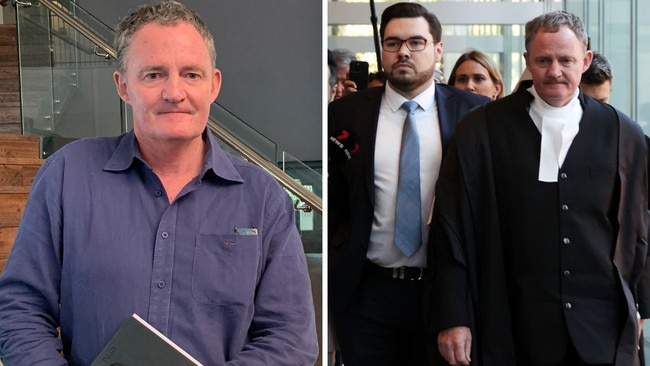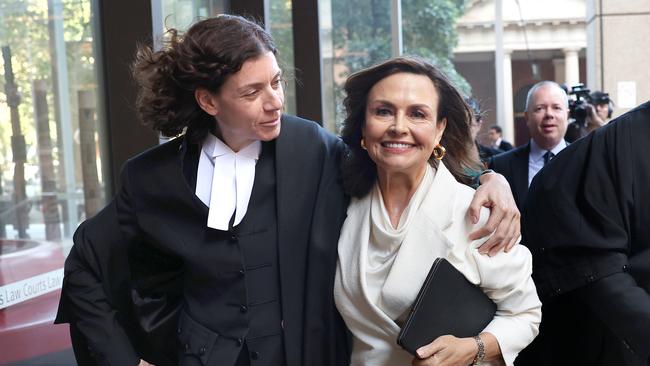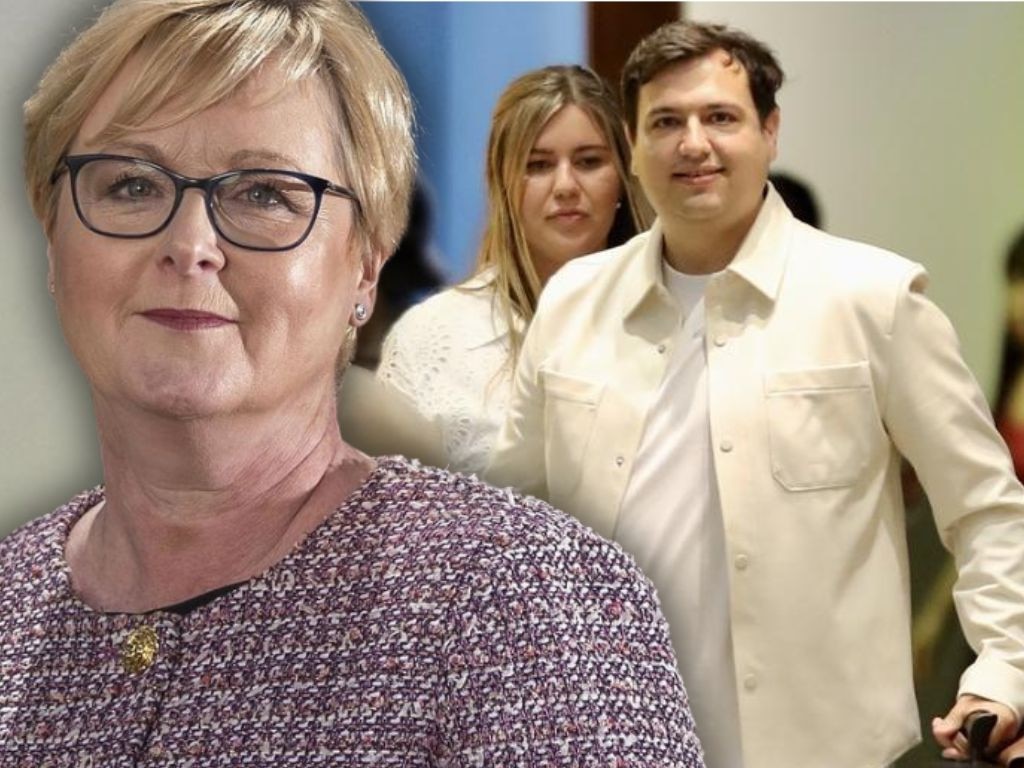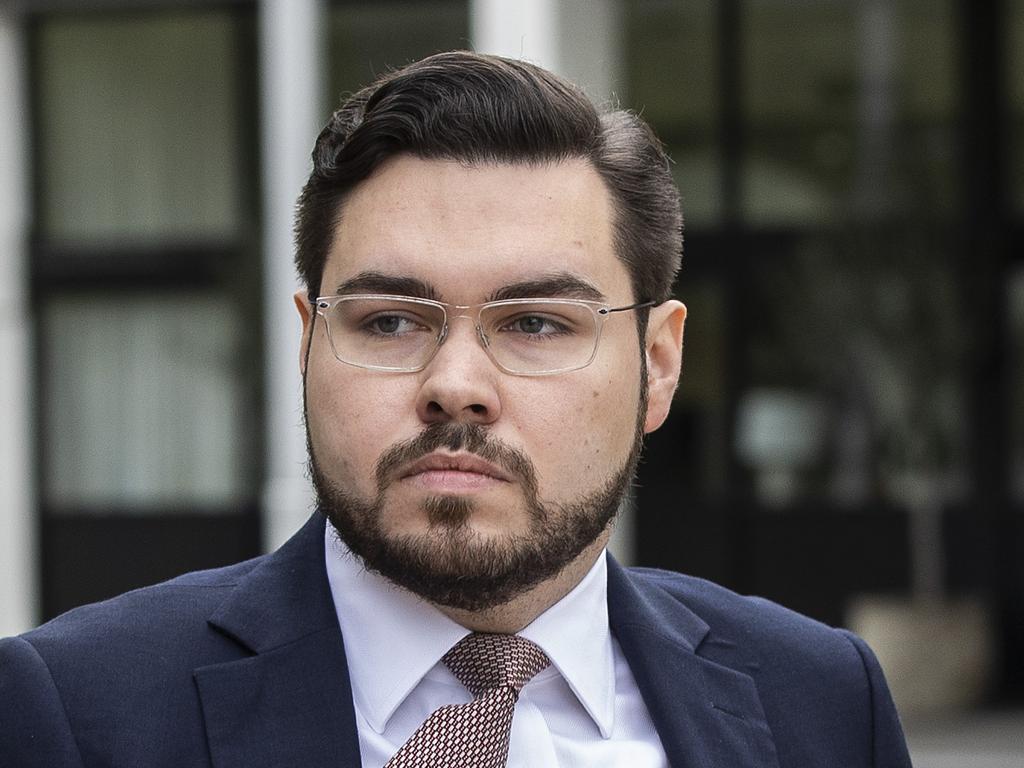Bruce Lehrmann lawyer Steven Whybrow speaks out on defamation decision
Steven Whybrow SC represented Bruce Lehrmann pro-bono. It nearly cost him his relationship

Steven Whybrow is looking forward to moving on.
It’s not that the exhausted barrister regrets giving up much of the past two years to defend his now notorious client, Bruce Lehrmann, through an inconclusive criminal trial and an unsuccessful defamation case. For Whybrow the motivation is closer to home.
“My partner said to me … ‘you choose Bruce or you choose me’, and I’ve decided to choose her,” Mr Whybrow told a conference in Fremantle on Wednesday, to a round of laughter.
“I was hoping that this decision on Tuesday would be the end of it. It’s the end of it for me, thank god.”
The veteran criminal lawyer and silk was speaking publicly for the first time since the defamation trial brought by Lehrmann against Network Ten and presenter Lisa Wilkinson, ended with Justice Michael Lee finding that, on the balance of probabilities, the former Liberal staffer raped co-worker Brittany Higgins in Parliament House.
Introduced by The Australian’s Janet Albrechtsen to an audience of 500 at the Australia: The Road Ahead conference, Mr Whybrow said he was yet to read the lengthy judgment handed down by Justice Lee.
“Think of it as a 300-page book that you got prescribed in year 11 for a subject that you’re sick of. It’s not something that I’ve managed to get to yet,” he said.
Mr Whybrow represented Mr Lehrmann pro bono during his criminal trial for the rape of Ms Higgins, proceedings that were ultimately abandoned because of juror misconduct and the charge being subsequently dropped.
The barrister said he hoped the publicity around the case would not dissuade victims from pursuing justice, noting that the Lehrmann-Higgins saga was not reflective of how the judicial system handled sexual assault cases.
“All those people who do suffer some form of abuse and do feel like they want to come forward but think that what happened in this case is going to be representative of the experience that they will have, that to me is the greatest sadness in this case, this perception and belief that what happened in this case is what happens in all cases with an alleged sexual assault,” he said.

“No person who makes (a sexual assault) allegation has to have their name in the media, nobody can publish anything that might identify them. They don’t have to be in the courtroom, they don’t have to see their alleged abuser. They’re allowed to have support people.
“There are so many subjects that they are rightly banned from being asked about. They don’t have to walk past the media pack each day or give media statements or post about it on social media. But there’s this perception that this is what it would be for somebody who might make a complaint. And that’s, to me, one of the saddest parts of this whole saga.”
Beyond his finding that Mr Lehrmann had raped Ms Higgins, Justice Lee also found that the narrative pushed by Ms Higgins and her partner David Sharaz – that her then-boss Senator Linda Reynolds and the senator’s chief of staff Fiona Brown had tried to cover up the incident – was untrue.
Mr Whybrow noted that it was the political aspect of the case that had elevated it.
“Bruce and Brittany were irrelevant in effect in this story. It never would have made the papers anywhere if it happened at somebody’s house, if they weren’t political staffers,” he said.
Justice Lee was highly critical in his judgment of the conduct of Ten and Wilkinson in their portrayal of Ms Higgins’ complaint and their lack of rigour in testing the merits of the “cover-up” narrative before they made it a central element of the story.

Mr Whybrow said the episode should lead to some reflection in the media, suggesting too many reporters had strayed away from the facts when reporting on the criminal trial. “I thought their job was to report the news, not to direct the news. And that’s easily done when you choose which bits of evidence you want to highlight or report on a particular day,” he said.
Mr Whybrow said Justice Lee deserved praise for his commitment to open justice, noting that his decision to make all exhibits from the defamation trial publicly available and broadcast the proceedings online meant that the ongoing debate over the saga would take place in a more informed environment.
“At least there’s going to be a capacity for evidence-based analysis in this matter.”
In the Lehrmann case, “everybody had an opinion, everybody had a view, usually, unless universally uninformed or based on some form of presumption or exception of norms,” Mr Whybrow said.
“I have probably 500 emails that I get from members of the public ranging from the abusive through to the amateur Colombos. All the people who were ready to pillory and take away Mr Lehrmann’s rights in many respects are the first people who, with a human rights scholar in China or a businessman in Russia or a journalist in Egypt who’ve been locked up without trial, will be outraged about the human rights abuses and the failure to support the right to silence or to even have an impartial forum.”
The former Crown prosecutor said he regarded it as very important that five judges in NSW had publicly expressed concern about the impact of the MeToo movement on the Director of Public Prosecutions’ assessment of rape cases, with some believing a pattern was emerging in which prosecutors preferred to take a “believe the victim” stance and push a matter before a jury, rather than dropping seemingly weaker cases.
“There are so many people who would not get up and say anything contrary to the running narrative (in the Lehrmann case) because it would have opened them up to criticism,” Whybrow said. “Indeed, anybody on Twitter who suggested anything even rational, which was calling into question some consistency or matter, would be shouted down as a rape apologist or misogynist.
“So those judges standing up and saying things like this is important because it helps the public to see that there are two sides to this.
“One of the scariest things for me is the fact that two judges have been subjected to complaints to the Judicial Commissions by the prosecution because the prosecution didn’t like the harsh words that were said about their case – to me that is very insidious. There is a process if you don’t like what a judge says you appeal, and the Court of Appeal will say: you say you stuffed up, or you didn’t.
“Judges are human beings - they could easily feel that ‘if I go too strongly here I’m going to have a complaint made against me’. It’s another form, potentially, of cancel culture.
“This recent spotlight on some of the cases that have been run, which are contrary to the written policies of every DPP – does the matter have reasonable prospects of success? – versus – did somebody make a complaint, we have to believe everybody – it’s a debate we have to have.”





